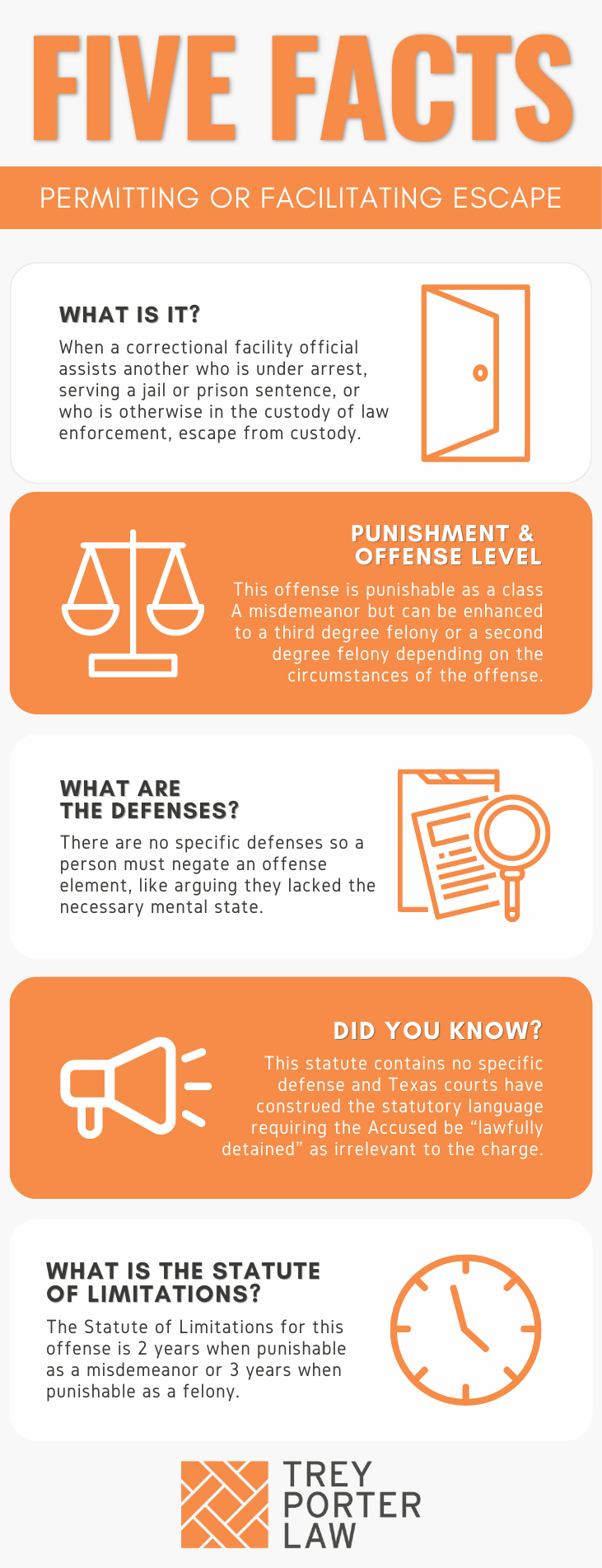WHAT IS PERMITTING OR FACILITATING ESCAPE IN TEXAS?
The Texas law against permitting or facilitating escape punishes officers or employees who help inmates, detainees, and arrestees escape custody.
WHAT IS THE PERMITTING OR FACILITATING ESCAPE LAW IN TEXAS?
Tex. Penal Code § 38.07. PERMITTING OR FACILITATING ESCAPE.
(a) An official or employee of a correctional facility commits an offense if he knowingly permits or facilitates the escape of a person in custody.
(b) A person commits an offense if he knowingly causes or facilitates the escape of one who is in custody pursuant to:
(1) an allegation or adjudication of delinquency; or
(2) involuntary commitment for mental illness or for chemical dependency.
(c) Except as provided in Subsections (d) and (e), an offense under this section is a Class A misdemeanor.
(d) An offense under this section is a felony of the third degree if the person in custody:
(1) was under arrest for, charged with, or convicted of a felony; or
(2) was confined in a correctional facility other than a secure correctional facility after conviction of a felony.
(e) An offense under this section is a felony of the second degree if:
(1) the actor or the person in custody used or threatened to use a deadly weapon to effect the escape; or
(2) the person in custody was confined in a secure correctional facility after conviction of a felony.
WHAT IS THE PENALTY CLASS FOR PERMITTING OR FACILITATING ESCAPE IN TEXAS?
Permitting or facilitating escape is a Class A misdemeanor by default, punishable by up to one year in county jail. It is a third degree felony, punishable by two to ten years in prison, to permit or facilitate another’s escape who was under arrest for, charged with, or convicted of a felony, or who was confined in a secure correctional facility.
Permitting or facilitating escape becomes a second degree felony, punishable by two to 20 years in prison, if the escapee was confined in a secure correctional facility after being convicted of a felony, or the person or escapee used or threatened to use a deadly weapon.
WHAT IS THE PUNISHMENT RANGE FOR PERMITTING OR FACILITATING ESCAPE IN TEXAS?
The punishment range for permitting or facilitating escape depends on the facts and circumstances of the escape.
- Second degree felony, punishable by two to twenty years in prison, and a maximum $10,000 fine, if:
- the person or the escapee uses or threatens to use a deadly weapon, or the escapee was confined in a secure correctional facility after conviction of a felony;
- Third degree felony, punishable by two to ten years in prison; up to $10,000 fine, if:
- the person permitted or facilitated another’s escape who was under arrest for or charged with a felony, or escapes from a secure correctional facility;
- All other permitting or facilitating escape charges are Class A misdemeanors, punishable by up to one year in jail, and a maximum $4,000 fine.
WHAT ARE THE PENALTIES FOR PERMITTING OR FACILITATING ESCAPE IN TEXAS?
A person charged with permitting or facilitating escape may be eligible for probation after a conviction, or deferred adjudication without a conviction. The maximum term of community supervision for a first degree, second degree, or third degree felony permitting or facilitating escape charge is ten years. The maximum community supervision term for a Class A misdemeanor permitting or facilitating escape charge is two years.
WHAT ARE THE DEFENSES TO PERMITTING OR FACILITATING ESCAPE IN TEXAS?
The statute does not authorize specific defenses to permitting or facilitating escape. A person accused thereof may attempt to negate at least one of the elements the State must prove at trial.
Just as a necessity defense and other justification defenses are available to those on trial for escape, one accused of permitting or facilitating escape may raise them.
- Can a person be charged with permitting or facilitating escape while illegally in custody? Texas Penal Code Section 38.08 provides that it is “no defense to prosecution under Section 38.06 or 38.07 that the custody was unlawful.” However, the escape law also requires a person to be “lawfully detained.” Courts have resolved this apparent conflict by applying the “lawfully detained” language narrowly, and deem the lawfulness of a person’s arrest or incarceration irrelevant as a defense to escape. Ultimately, the law requires a person to submit to an arrest to maintain public order.
WHAT IS THE STATUTE OF LIMITATIONS FOR PERMITTING OR FACILITATING ESCAPE IN TEXAS?
The limitation period for escape categorized as a Class A misdemeanor is two years. If a person is charged with a first degree, second degree, or third degree felony escape, the limitation period is three years.
PERMITTING OR FACILITATING ESCAPE IN TEXAS
The permitting or facilitating escape statute generally applies to those with a responsibility to maintain persons in custody, such as jailers of penal institutions, correctional facility employees, or other officials in secure facilities. Others who aid a person’s escape may be charged as a party to the escape itself.
TEXAS PERMITTING OR FACILITATING ESCAPE COURT CASES
The case law regarding permitting or facilitating escape in Texas is scarce, as officials who help prisoners escape are often charged with conspiracy to commit escape, and additional more serious offenses.
- In Bivens v. State, the defendant was a jailer at the Liberty County Jail who let an inmate take his jail keys, and use his car to escape. He was convicted of permitting or facilitating escape, and the appellate court affirmed.













